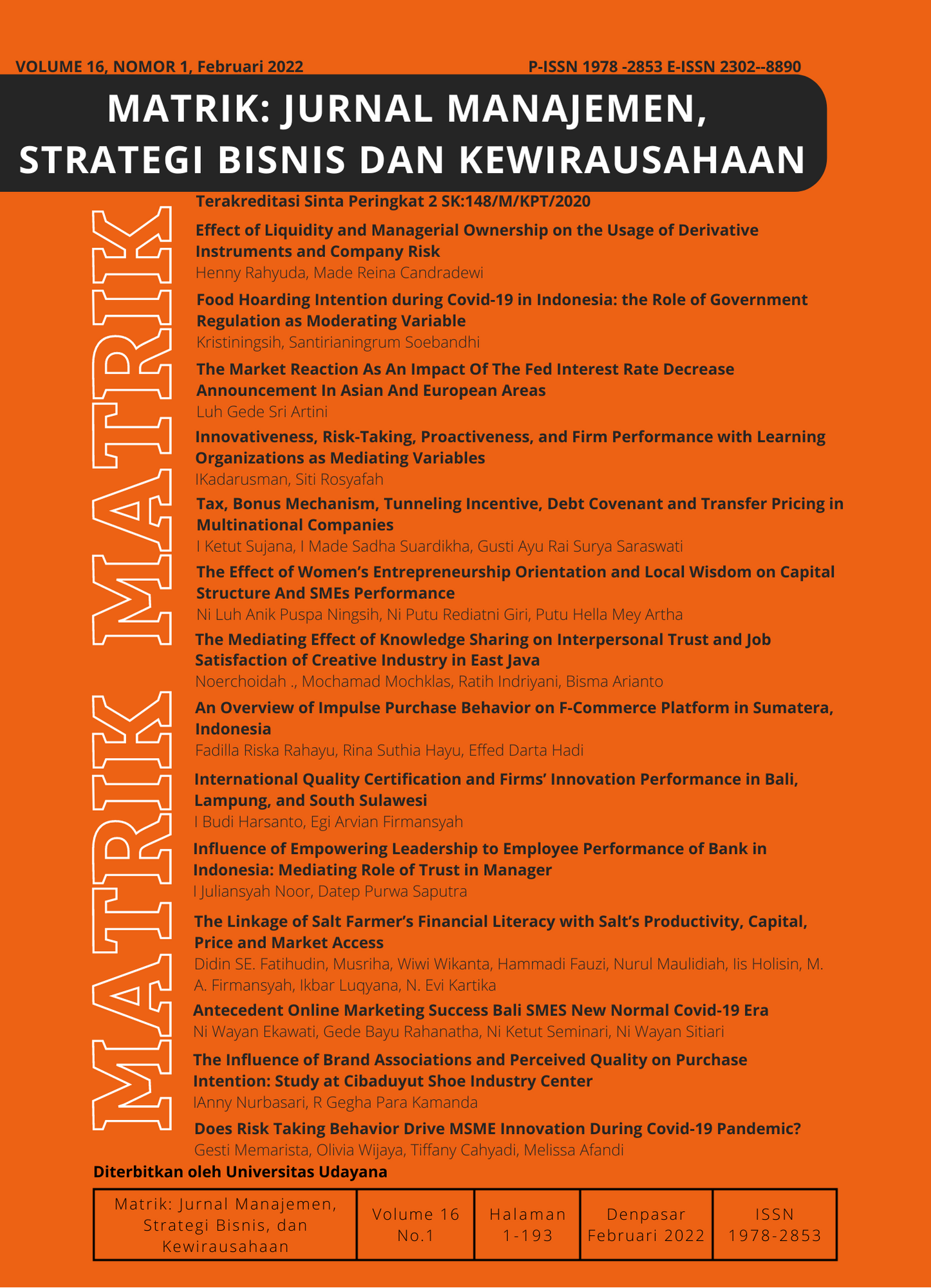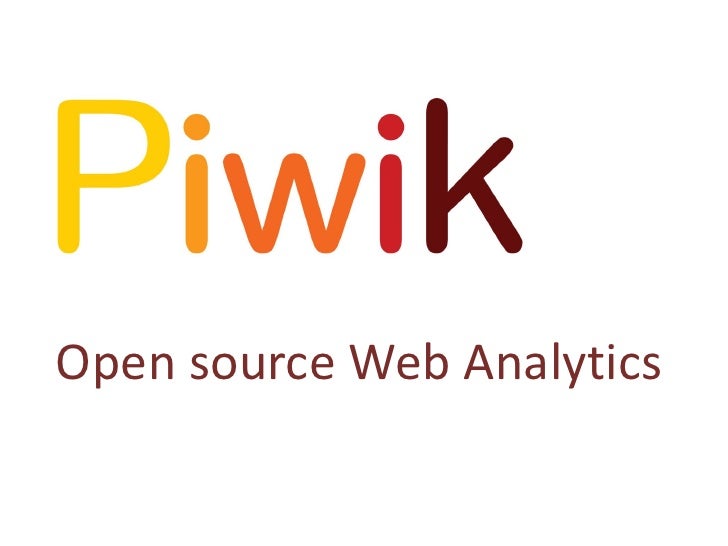Food Hoarding Intention during Covid-19 in Indonesia: the Role of Government Regulation as Moderating Variable
Abstract
The outbreak of Covid-19 in early 2020 has raised public anxiety because of the uncertainty about the impact of this outbreak. At the beginning of this outbreak, we often encountered unusual purchasing behavior. One of them is by hoarding food or buying basic needs in large quantities in anticipation of the possible impacts during the Covid-19 pandemic. Therefore, this study aims to analyze the effect of risk perception and the three components of Theory of Planned Behavior (TPB), namely: attitudes, subjective norms, and perceived behavioral control on individual intentions to hoard basic needs in order to understand individual responses to pandemic conditions. This study also adds government regulations related to Large-Scale Social Restrictions (PSBB) as a moderating variable. This study involved 194 respondents. The data obtained were then processed using the PLS-SEM method. The findings of this study indicate that food hoarding intention is influenced by risk perception and the three TPB components. Meanwhile, PSBB did not moderate the relationship between the three TPB components on food hoarding intention.
Downloads
References
Ajzen, I. (1991). The Theory of Planned Behavior. Organizational Behavior and Human Decision Processes, 50(2), 179-211.
Ajzen, I. (2008). Consumer Attitudes and Behavior. In C. P. Haugtvedt, P. Herr & F. Kardes (Eds.), Handbook of Consumer Psychology (pp. 525–548). New York: Lawrance Erlbaum Associates.
Arafat, S. M. Y., Kar, S. K., Marthoenis, M., Sharma, P., Hoque Apu, E., & Kabir, R. (2020). Psychological Underpinning of Panic Buying During Pandemic (COVID-19). Psychiatry research, 289, 113061-113061. doi: 10.1016/j.psychres.2020.113061
Baddeley, M. (2020). Hoarding in The Age of COVID-19. Journal of Behavioral Economics for Policy, 4(S), 69-75.
Bae, S. Y., & Chang, P.-J. (2020). The Effect of Coronavirus Disease-19 (Covid-19) Risk Perception on Behavioural Intention towards ‘Untact’ Tourism in South Korea during the First Wave of the Pandemic (March 2020). Current Issues in Tourism. doi: 10.1080/13683500.2020.1798895
Ballantine, P. W., Zafar, S., & Parsons, A. G. (2014). Changes in Retail Shopping Behaviour in the Aftermath of an Earthquake. The International Review of Retail, Distribution and Consumer Research, 24(1), 1-13. doi: 10.1080/09593969.2013.821419
Bavel, J. J. V., Baicker, K., Boggio, P. S., Capraro, V., Cichocka, A., Cikara, M., . . . Willer, R. (2020). Using Social and Behavioural Science to Support COVID-19 Pandemic Response. Nature Human Behaviour, 4(5), 460-471. doi: 10.1038/s41562-020-0884-z
Bourassa, M., Doraty, K., Berdahl, L., Fried, J., & Bell, S. (2016). Support, Opposition, Emotion and Contentious Issue Risk Perception. International Journal of Public Sector Management, 29(2), 201-216. doi: 10.1108/IJPSM-10-2015-0172
Carroll, L. (2020). Who Bought All The Toilet Paper? Study Suggests Who Was Most Likely To Stockpile During COVID-19. diakses pada 7 September 2020, dari https://www.nbcnews.com/health/health-news/who-bought-all-toilet-paper-study-suggests-who-was-most-n1230586
Choi, T.-M., Chiu, C.-H., & Chan, H.-K. (2016). Risk Management of Logistics Systems. Transportation Research Part E: Logistics and Transportation Review, 90, 1-6. doi: https://doi.org/10.1016/j.tre.2016.03.007
Conner, M. (2001). Health Behaviors. In N. J. Smelser & P. B. Baltes (Eds.), International Encyclopedia of the Social & Behavioral Sciences (pp. 6506-6512). Oxford: Pergamon.
Deng, Y., Wang, M., & Yousefpour, R. (2017). How do People's Perceptions and Climatic Disaster Experiences Influence Their Daily Behaviors Regarding Adaptation to Climate Change? — A Case Study Among Young Generations. Science of The Total Environment, 581-582, 840-847. doi: https://doi.org/10.1016/j.scitotenv.2017.01.022
Dexter, R., & Sakkal, P. (2020). 'Chaos': South Australia Lockdown Sparks Panic Buying with Toilet Paper Stripped from Shelves. diakses pada 11 November 2020, dari https://www.smh.com.au/national/chaos-south-australia-lockdown-sparks-panic-buying-with-toilet-paper-stripped-from-shelves-20201118-p56fqg.html
Dholakia, U. (2020). Why Are We Panic Buying During the Coronavirus Pandemic? diakses pada 10 Mei 2020, dari https://www.psychologytoday.com/sg/blog/the-science-behind-behavior/202003/why-are-we-panic-buying-during-the-coronavirus-pandemic
Djalante, R., Lassa, J., Setiamarga, D., Sudjatma, A., Indrawan, M., Haryanto, B., . . . Warsilah, H. (2020). Review and Analysis of Current Responses to Covid-19 in Indonesia: Period of January To March 2020. Progress in Disaster Science, 6(100091).
Dreu, C. K. W. D., & Nauta, A. (2009). Self-Interest and Other-Orientation in Organizational Behavior: Implications for Job Performance, Prosocial Behavior, and Personal Initiative. Journal of Applied Psychology, 913–926. doi: 10.1037/a0014494
Frank, B., & Schvaneveldt, S. J. (2016). Understanding Consumer Reactions to Product Contamination Risks After National Disasters: The Roles of Knowledge, Experience, and Information Sources. Journal of Retailing and Consumer Services, 28, 199-208. doi: https://doi.org/10.1016/j.jretconser.2015.08.005
Grimm, P. E. (2005). Ab Components' Impact on Brand Preference. Journal of Business Research, 58, 508-517. doi: 10.1016/S0148-2963(03)00141-3
Ham, M., Jeger, M., & Ivković, A. F. (2015). The Role of Subjective Norms in Forming the Intention TO Purchase Green Food. Economic Research-Ekonomska Istraživanja, 28(1), 738-748. doi: 10.1080/1331677X.2015.1083875
Hoyer, W. D., MacInnis, D. J., & Pieters, R. (2013). Consumer Behavior (6th ed.). South-Western: Cengage Learning.
Humas Kemenkes. (2020). Menkes Teken Permenkes Nomor 9 Tahun 2020 Soal Tata Cara Usulan PSBB. diakses pada 10 Juni 2020 2020, dari https://setkab.go.id/menkes-teken-permenkes-nomor-9-tahun-2020-soal-tata-cara-usulan-psbb/
Jarvenpaa, S. L., Tractinsky, N., & Saarinen, L. (1999). Consumer Trust in an Internet Store: A Cross-Cultural Validation. Journal of Computer-Mediated Communication, 5(2), 0-0. doi: https://doi.org/10.1111/j.1083-6101.1999.tb00337.x
Johnson, E. J., & Tversky, A. (1983). Affect, Generalization, and the Perception of Risk. Journal of Personality and Social Psychology, 45(1), , 20-31.
Kemp, E., Kennett-Hensel, P. A., & Williams, K. H. (2014). The Calm before the Storm: Examining Emotion Regulation Consumption in the Face of an Impending Disaster. 31(11), 933-945. doi: https://doi.org/10.1002/mar.20744
Kennett‐Hensel, P. A., Sneath, J. Z., & Lacey, R. (2012). Liminality and Consumption in the Aftermath of a Natural Disaster. Journal of Consumer Marketing, 29(1).
Kristiningsih, K., Hartini, S., & Usman, I. (2020). The Role of Supply Chain Management on Consumer Service Innovativeness and Consumer Attitude. International Journal of Supply Chain Management, 9(1), 732-739.
Lee, M.-C. (2009). Factors Influencing the Adoption of Internet Banking: An integration of TAM and TPB with Perceived Risk and Perceived Benefit. Electronic Commerce Research and Applications, 8(3), 130-141. doi: https://doi.org/10.1016/j.elerap.2008.11.006
Loasana, N. (2020). Panic Buying Hits Jakarta Supermarkets as Govt Announces First Covid-19 Cases. diakses pada 15 Juni 2020, dari https://www.thejakartapost.com/news/2020/03/03/panic-buying-hits-jakarta-supermarkets-as-govt-announces-first-covid-19-cases.html
Long, N. N., & Khoi, B. H. (2020). An Empirical Study about the Intention to Hoard Food during COVID-19 Pandemic. EURASIA Journal of Mathematics, Science and Technology Education,, 16(7). doi: 10.29333/ejmste/8207
Lubis, M. S. W. (2020). Dampak PSBB: Makin Efisien, Belanja Balas Dendam Bantu Pemulihan. diakses pada 12 Juni 2020, dari https://ekonomi.bisnis.com/read/20200430/12/1235182/dampak-psbb-makin-efisien-belanja-balas-dendam-bantu-pemulihan
Meodia, A. (2020). PSBB Jakarta jilid II Dinilai Tak Ubah Pola Belanja Daring Masyarakat. diakses pada 15 September 2020, dari https://www.antaranews.com/berita/1721106/psbb-jakarta-jilid-ii-dinilai-tak-ubah-pola-belanja-daring-masyarakat
Power, M., Doherty, B., Pybus, K., & Pickett, K. (2020). How COVID-19 Has Exposed Inequalities in the UK Food System: The Case of UK Food and Poverty. Emerald Open Research, 2, 11. doi: 10.35241/emeraldopenres.13539.2
Puspita, R. (2020). Wamendes: Jangan Timbun Makanan Gara-Gara Corona. diakses pada 5 April 2020, dari https://republika.co.id/berita/q6nma8428/wamendes-jangan-timbun-makanan-garagara-corona
Putra, N. P. (2020). HEADLINE: Virus Corona Picu Panic Buying Makanan, Masker, Hand Sanitizer, Bagaimana Meredamnya? diakses pada 19 November 2020, dari https://www.liputan6.com/news/read/4193886/headline-virus-corona-picu-panic-buying-makanan-masker-hand-sanitizer-bagaimana-meredamnya
Quintal, V. A., Lee, J. A., & Soutar, G. N. (2010). Risk, Uncertainty and the Theory of Planned Behavior: A Tourism Example. Tourism Management, 31(6), 797-805. doi: https://doi.org/10.1016/j.tourman.2009.08.006
Rosenberg, M. J., & Hovland, C. I. (1960). Cognitive, Affective and Behavioral Components of Attitudes. In M. J. Rosenberg, C. I. Hovland, W. J. McGuire, R. P. Abelson & J. W. Brehm (Eds.), Attitude Organization and Change: An Analysis of Consistency among Attitude Components (pp. 1–14). New Haven, CT: Yale University Press.
Sari, D. N. (2020). Efek Samping PSBB Terhadap Masyarakat. diakses pada 12 Juni 2020, dari https://www.suara.com/yoursay/2020/04/16/171009/efek-samping-psbb-terhadap-masyarakat
Sheu, J.-B., & Kuo, H.-T. (2020). Dual Speculative Hoarding: A Wholesaler-Retailer Channel Behavioral Phenomenon Behind Potential Natural Hazard Threats. International Journal of Disaster Risk Reduction, 44, 101430. doi: https://doi.org/10.1016/j.ijdrr.2019.101430
Sholihin, M., & Ratmono, D. (2013). Analisis SEM-PLS dengan WarpPLS 3.0. Yogyakarta: Penerbit Andi.
Sjöberg, L., Moen, B.-E., & Rundmo, T. (2004). Explaining Risk Perception. An Evaluation of the Psychometric Paradigm in Risk Perception Research. Trondheim: Rotunde.
Snapcart. (2020). COVID-19 Impact on Indonesian Shopper Habits. diakses pada 10 Juni 2020, dari https://snapcart.global/covid-19-impact-on-indonesian-shopper-habits/
Sneath, J. Z., Lacey, R., & Kennett-Hensel, P. A. (2009). Coping with a Natural Disaster: Losses, Emotions, and Impulsive and Compulsive Buying. Marketing Letters, 20(1), 45-60. doi: 10.1007/s11002-008-9049-y
Soebandhi, S., Hartini, S., & Gunawan, S. (2020). Engaging Young Consumers with Advergames: The effect of Presence and Flow Experience. In R. Hurriyati, B. Tjahjono, I. Yamamoto, A. Rahayu, A. G. Abdullah & A. A. Danuwijaya (Eds.), Advances in Business, Management and Entrepreneurship (pp. 97-101). London: Taylor & Francis Group.
Sterman, J. D., & Dogan, G. (2015). “I’m not hoarding, I’m just stocking up before the hoarders get here.”: Behavioral causes of phantom ordering in supply chains. Journal of Operations Management, 39-40, 6-22. doi: https://doi.org/10.1016/j.jom.2015.07.002
United Nations. (2020). Launch of Global Humanitarian Response Plan for COVID-19 [Press release]. Retrieved from https://www.un.org/sg/en/content/sg/press-encounter/2020-03-25/launch-of-global-humanitarian-response-plan-for-covid-19
Wang, Z., Liu, X., & Zhang, S. (2019). A New Decision Method for Public Opinion Crisis with the Intervention of Risk Perception of the Public. Complexity, 2019, 9527218. doi: 10.1155/2019/9527218
Wen, X., Sun, S., Li, L., He, Q., & Tsai, F. S. (2019). Avian Influenza-Factors Affecting Consumers' Purchase Intentions toward Poultry Products. International journal of environmental research and public health, 16(21). doi: 10.3390/ijerph16214139
Wilkens, J. (2020). Why We Hoard: Fear at Root of Panic-Buying, Psychologists Say. diakses pada 10 Juni 2020, dari https://www.sandiegouniontribune.com/news/health/story/2020-03-22/hoard-fear-panic-buying-psychology
Williams, D. J., & Noyes, J. M. (2007). How Does Our Perception of Risk Influence Decision-Making? Implications for the Design of Risk Information. Theoretical Issues in Ergonomics Science, 8(1), 1-35. doi: 10.1080/14639220500484419
Wiyono, G. (2011). Merancang Penelitian Bisnis dengan Alat Analisis SPSS 17.0 & SmartPls 2.0. Yogyakarta: UPP STIM YKPN.
Yangui, W., & Hajtaïeb El Aoud, N. (2015). Consumer Behavior and the Anticipation of a Total Stockout for a Food Product: Proposing and Validating A Theoretical Model. The International Review of Retail, Distribution and Consumer Research, 25(2), 181-203. doi: 10.1080/09593969.2014.951675
Yuen, K. F., Wang, X., Ma, F., & Li, K. X. (2020). The Psychological Causes of Panic Buying Following a Health Crisis. International journal of environmental research and public health, 17(10), 3513. doi: 10.3390/ijerph17103513
Zheng, R., Shou, B., & Yang, J. (2020). Supply Disruption Management under Consumer Panic Buying and Social Learning Effects. Omega, 102238. doi: https://doi.org/10.1016/j.omega.2020.102238
 This work is licensed under a Creative Commons Attribution-ShareAlike 4.0 International License.
This work is licensed under a Creative Commons Attribution-ShareAlike 4.0 International License.

















